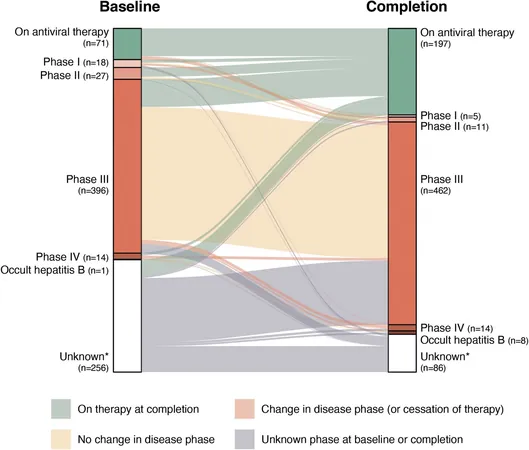
Revolutionary New Process Simplifies Biodiesel Production and Cuts Energy Costs!
2024-11-08
Author: Arjun
Revolutionary New Process Simplifies Biodiesel Production and Cuts Energy Costs!
Chemists at UC Santa Cruz have unveiled a groundbreaking method that revolutionizes the production of biodiesel from waste oil, making it easier and significantly less energy-intensive. This innovative discovery holds the promise of transforming the biofuel landscape, potentially capturing the interest of industrial sectors that are vital to the nation’s economy.
Biodiesel and the U.S. Transportation Sector
In 2022 alone, the U.S. transportation sector consumed approximately 3 million barrels of diesel per day, constituting a staggering 75% of the country’s overall diesel consumption. This heavy reliance contributes to about 10% of the energy-related CO2 emissions in the U.S., as reported by the federal Energy Information Administration.
Challenges in Biodiesel Production
Despite the rise of electric vehicles, many fleets continue to depend on diesel engines due to the complexities and high energy demands involved in biodiesel production. As a result, biofuels represented a meager 6% of the energy mix in the transportation sector that year.
Key Findings of the Study
In a study published on October 3 in the American Chemical Society journal *Energy & Fuels*, lead author Kevin Lofgren outlined a novel approach to converting used vegetable oil into biodiesel, utilizing sodium tetramethoxyborate (NaB(OMe)4). This unique chemical ingredient simplifies the separation of biodiesel from production byproducts, allowing for easy disposal by simply pouring them off.
Advantages Over Traditional Methods
Notably, the byproducts derived from this method can be recycled to replenish the most expensive raw material required in biodiesel production. Adding to its advantages, the biodiesel synthesis can be completed in less than an hour at temperatures as low as 40°C (104°F), resulting in significant energy savings and cost effectiveness compared to traditional methods.
Quotes from Researchers
"I've always had a passion for biodiesel," shared Lofgren, a Ph.D. student in chemistry at UC Santa Cruz. "Exploring this innovative material allowed me to find an efficient way to process fats in oil for biodiesel catalyzation."
Dependence on Diesel Fuel
While individual consumers are increasingly turning to solar and electric energy solutions, large industrial sectors remain dependent on diesel fuel. Lofgren emphasized that the vast majority of trucks, trains, and vessels that facilitate global trade cannot shift to electric propulsion overnight.
Biodiesel: A Viable Alternative?
What’s more, biodiesel is a carbon-neutral fuel that is readily available and approved for use in these vehicles without requiring engine modifications. So, why are industrial giants not yet flocking to biodiesel?
Current Limitations
Presently, many existing biodiesel production techniques produce soap as a byproduct, complicating fuel purification and lowering yield. Other methods rely heavily on palm oil, leading to environmentally damaging deforestation for monoculture plantations. In stark contrast, the new technique described in this study can create biodiesel at temperatures lower than boiling water, thereby reducing energy consumption.
Environmental Impact
"Our method utilizes waste oil and operates at mild temperatures, making it much less energy-demanding compared to traditional petroleum refining processes that cause significant pollution," stated co-author Scott Oliver, a professor of chemistry and biochemistry.
Yield and Efficiency
Remarkably, the technique has been shown to convert about 85% of used vegetable oil into biodiesel, adhering to nearly all industry standards for heavy machinery and transportation fuel. The only hurdle noted was slightly elevated water content, anticipated to be resolved upon scaling the process.
Economic Benefits
"This innovative method is not only simple and affordable but also allows for regeneration of the starting materials," Lofgren added. "It’s already competitively priced, but being able to recycle the expensive components optimizes long-term costs."
Future Implications
As professor Oliver aptly stated, "Energy is a universal need—every farm, food processing plant, and transportation system relies on it. This new approach could make a significant impact, as it can be implemented at just above room temperature and is reusable. It eliminates the need for extensive refinery setups, allowing this method to be utilized directly on farms."
Conclusion
With such potential to reshape the energy landscape, the question remains: will biodiesel finally take center stage in the fight against climate change?




 Brasil (PT)
Brasil (PT)
 Canada (EN)
Canada (EN)
 Chile (ES)
Chile (ES)
 Česko (CS)
Česko (CS)
 대한민국 (KO)
대한민국 (KO)
 España (ES)
España (ES)
 France (FR)
France (FR)
 Hong Kong (EN)
Hong Kong (EN)
 Italia (IT)
Italia (IT)
 日本 (JA)
日本 (JA)
 Magyarország (HU)
Magyarország (HU)
 Norge (NO)
Norge (NO)
 Polska (PL)
Polska (PL)
 Schweiz (DE)
Schweiz (DE)
 Singapore (EN)
Singapore (EN)
 Sverige (SV)
Sverige (SV)
 Suomi (FI)
Suomi (FI)
 Türkiye (TR)
Türkiye (TR)
 الإمارات العربية المتحدة (AR)
الإمارات العربية المتحدة (AR)